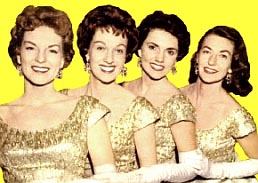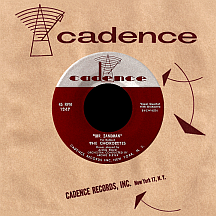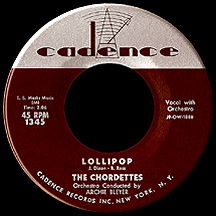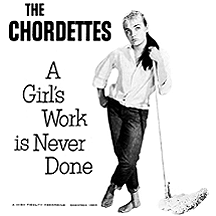THE CHORDETTES
A group of friends from Sheboygan, Wisconsin were devotees of the barbershop harmony tradition while growing up in the 1930s and '40s. The fact they were women, singleminded in their desire to master an a cappella vocal art that had been dominated by men for the better part of a century, made them unique. When they began performing in public and on record in the mid-20th century, they couldn't help but attract attention. The Chordettes, named as such to leave little or no doubt as to what they were about, were popular at first on television; when their recording of "Mr. Sandman" became a major hit, the group enjoyed several years in the spotlight while adjusting their approach as time passed to fit the pop, rock and roll and teenage musical trends of the 1950s.
Jinny Osborn started the quartet in 1946 with Carol Buschmann, Janet Ertel and lead singer Dorothy Schwartz. After performing on Arthur Godfrey's Talent Scouts radio show in 1949, they were hired as regulars on the TV version of the series, which featured bandleader Archie Bleyer. Columbia Records signed the act the following year and they backed Godfrey (also on Columbia, he had already placed a few records high on the hit parade) on their first disc, "Down by the Old Mill Stream," a half-century-old song firmly established as a barbershop classic...but a longshot for becoming a 1950s hit. Several other releases over the next few years weren't particularly strong sellers, a letdown considering tens of millions of people watched them each week on Godfrey's top-rated shows. Dorothy departed during this time and was replaced by non-Sheboygan-born Lynn Evans, who stepped right into the lead singer role.
Bleyer founded Cadence Records near the end of 1952, hitting pay dirt shortly afterwards with a pair of hits by Julius LaRosa, another of Godfrey's regular performers. Archie fell for Janet Ertel (who was closer to his age than the twenty-something others) and she for him; they were married in '54, right around the time he signed the Chordettes to a contract with Cadence. He envisioned something different for the group than Godfrey or Columbia bossman Mitch Miller had; Godfrey went so far as to advise the girls against doing anything other than barbershop harmony. But Bleyer intended to contemporize the group's sound, a necessary adjustment if they were to rise to the next level. Debut "It's You, It's You I Love" came off closer to an Andrews Sisters throwback and gained little traction, but the quartet's second single crashed through the roof.
Group founder Jinny got pregnant and had to leave the Chordettes for several months, thus missing out on being involved in their incredible breakthrough. Margie Needham, a flight attendant and barbershop practitioner from Chicago, temporarily stepped in. "Mr. Sandman," penned by Pennsylvanian Pat Ballard, had been recorded that year by Vaughn Monroe (the flip side of his summer hit "They Were Doin' the Mambo"); Bleyer felt the lyrics were more suitable to a female interpretation. He contributed the knee-slapping sound on the record and purposely produced the session with a minimal band arrangement in order to highlight the Chordettes' impressive harmonies. 'Mr. Sandman, send me a dream...make him the cutest that I've ever seen...' rapidly found its way into the public's consciousness, climbing to number one within weeks of release and remaining there for most of December 1954 and January '55, not a bit fazed by a cover from The Four Aces, whose version was also very popular.
The Chordettes rode the line between the mainstream pop style of the time and the more youthful, emerging rock and roll girl group sound, something their contemporaries (McGuire, Fontane, DeJohn and various other sister acts) had difficulty with (or simply didn't attempt). Archie Bleyer's forward-thinking approach, as opposed to the fast-becoming-a-relic Godfrey (musically, at least, though his popularity on the small screen continued unabated for quite awhile), resulted in some hit-and-miss efforts but ensured their success over the longer haul. "Lonely Lips" was one of the misses, an unexpected failure considering its way-more-than-million-selling lead-in. Their version of Don Robertson's "Humming Bird" cracked under competition from Les Paul and Mary Ford, whose take on the song went top ten in August '55.
After "The Wedding" in early 1956, the foursome landed a long-awaited follow-up hit with "Eddie My Love," though it fought a three-way battle with the Fontane Sisters and the original version by The Teen Queens; by April all three had reached the top 20. The harmony arrangements remained intact while the Chordettes' material leaned ever closer to a teenage sensibility. Another Robertson song, "Born to Be With You," returned them to national top ten that summer. "Lay Down Your Arms" marched into the chart's upper regions a few months later. Archie made his best effort to present the group, still rooted in (and experts at) complex four-part harmonies, as fresh and current as needed to keep their public profile high. The reverb-drenched Carl Sigman-Werner Müller song "Echo of Love" proved again there was was no guarantee a hit would result every time. "Just Between You and Me" (written by New Yorker Jack Keller and Jersey girl Cathy Lee) is perhaps the most youthful of the Chordettes' hits with its 'Sittin' in the sand...ba-da-da-da-da...we were holdin' hands' teenage secret (a perfect summertime beach song in Bleyer's opinion), another top 20 hit in late '57.
Besides "Mr. Sandman," one other Chordettes song achieved pop culture staying power. Julius Dixon and another Jersey girl, Beverly Ross, penned "Lollipop" ('...oh lolli-lolli-lolli...'), recorded by Beverly and Ronald Gumm for RCA Victor in 1958 under the name Ronald and Ruby. Bleyer recognized the potential it held for his feminine quartet and rushed out a version to compete; the original reached the top 40 while the Chordettes blasted to number two in March (held at bay by those "Tequila"-drinkin' Champs). The next hit was the theme from ABC-TV's "Zorro" series (produced by Walt Disney Studios and starring Guy Williams as Don Diego, the 'sign of the Z' sword-wielding hero), complete with horse-galloping and sword-slashing sound effects to further dramatize the group's vocal blend. In early '59, the forever-faithful message of "No Other Arms, No Other Lips" winsomely checked the 'dettes into the top 40.

The quartet came closest to rock and roll with both sides of the next single. "A Girl's Work is Never Done," their summer '59 answer to The Coasters' chart-topping "Yakety Yak," tells the chore-time tale from the toiling teenager's viewpoint; sax player supreme King Curtis supplied the signature sound as he'd done for the Coasters. The flip side, "No Wheels," obviously inspired by Edd Byrnes' "Kookie" character from 77 Sunset Strip (and hit single "Kookie, Kookie (Lend Me Your Comb)"), finds the Chordettes in the background; Jeff Kron, a classmate of Jackie Ertel (Janet's daughter from a previous marriage) supplied the spoken Byrnes imitation and Jackie added some 'No, no, no!' lines of her own. A promotional film featuring both songs was produced for screening in theaters and use on TV variety shows, amounting to a very early example of the music video concept.
Around this time, former big band singer Nancy Overton replaced Janet Ertel on live performances, though Janet continued recording with the quartet. The theme from "Never on Sunday," a film directed by Jules Dassin and starring Melina Mercouri, had already been a hit instrumental for Don Costa in the latter half of 1960 (though it was Manos Hadjidakis who composed it and won an Oscar for Best Original Song). The Chordettes' vocal version hit the top 20 the following summer. Founding member Jinny Osborn left the group and the remaining three decided to go their separate ways; a few earlier recordings were issued over the next couple of years, with "True Love Goes On and On" ironically marking the end in 1963. Various members, two or three at a time, occasionally reunited to perform, but The Chordettes made no more records. The blockbuster hits "Mr. Sandman" and "Lollipop" have taken on lives of their own and still resonate. In 1964 Archie Bleyer, satisfied with the great success his Cadence operation enjoyed over its decade-plus of existence, opted not to test the changing tides of music in the mid-'60s and shuttered the label. He and Chordette/wife Janet retired and lived happily ever after.
NOTABLE SINGLES:
- Down by the Old Mill Stream - 1950
by Arthur Godfrey and the Chordettes - Runnin' Wild - 1951
- It's You, It's You I Love - 1954
- Mr. Sandman - 1954
- Lonely Lips - 1955
- Humming Bird - 1955
- The Wedding - 1956
- Eddie My Love - 1956
- Born to Be With You - 1956
- Lay Down Your Arms /
Teen Age Goodnight - 1956 - (Fifi's) Walkin' the Poodle - 1957
- Echo of Love - 1957
- Just Between You and Me /
Soft Sands - 1957 - Lollipop - 1958
- Zorro - 1958
- No Other Arms, No Other Lips - 1959
- A Girl's Work is Never Done /
No Wheels - 1959 - A Broken Vow - 1960
- Never on Sunday /
Faraway Star - 1961 - True Love Goes On and On - 1963





